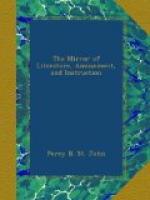of his wonderful genius: but no such testimony
is at all wanting; the songs of Burns are sung in
every quarter of the globe, and his poems are treasured
in millions of memories, so that his fame may set
fate at defiance. All this was rapturously received;
nor was the approbation of the company less coldly
manifested when the chairman proposed ‘the health
of the ETTRICK SHEPHERD;’ it appeared, however,
that he was much less familiar with his works than
with those of Burns, and though a native of a pastoral
district, made sad work among the romances and ballads
of the imaginative shepherd. This want was, however,
in some degree supplied, by a most characteristic
speech from Hogg himself, in which he related how
the inspiration of the muse came upon him, in consequence
of his being born, like Burns, on the 25th of January;
how, on the evening of his birth, a man and horse
were dispatched for the midwife, but the night being
wild, and Ettrick deep in flood, the rider was lost;
nevertheless, the familiar spirit called Brownie—the
Lubber-Fiend of Milton—supplied his place,
and brought the marvelling midwife in time to achieve
the adventure of the future poet of Kilmeny. All
this, and much more he related in a way hovering between
jest and earnest, and in a strong Ettrick tone, to
the consternation of the English part of the meeting,
for whom it was rather peculiar and learned. The
audience evidently, one and all, regarded the Shepherd
with wonder, and hundreds were on tiptoe to have a
look at him as he stood on a table to relate his own
varied fortunes.
“But on the banks of Tweed the chairman was
aware that a wizard, still more enchanting than him
of Yarrow, lived, or rather, lately lived; and he
accordingly gave the health of ’SIR WALTER SCOTT,
and a safe return to his native country.’
It is needless to say with what rapture the health
of this most illustrious of all the sons of Scotland
was drunk. This honour—such is the
word—was acknowledged by Mr. Lockhart, in
a speech worth any two chapters in the whole range
of British Biography;—it was clear and
concise—vigorous and picturesque—and
abounding with anecdote. Of his illustrious father-in-law,
he told how Burns predicted his future fame, in the
house of Adam Ferguson; and of Hogg he related how
Scott found him, thirty-five years ago, with his plaid
and dog, watching his sheep on Ettrick Banks, with
more old border ballads on his memory than any traditionary
dame of the district, and with more true poetry in
his heart than was usual to the lot of poets.
Of Hogg himself he said much that was amusing and
instructive: one anecdote will not soon be forgotten.
The Shepherd was at the dinner-table of a duchess,
when her Grace said, ‘Mr. Hogg, where you ever
here before?’ ‘Madam,’ said the poet,
’I have driven cattle often past your gates,
but I never was within them till now.’”




